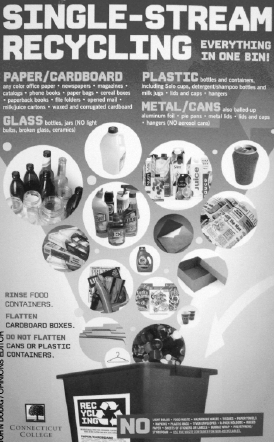
Single-stream recycling is taking over Conn.
Connecticut College is a small community in which secrets are scarce. Rumors spread like H1N1—our private lives are all but communal and as a result little escapes our ever-judging eyes. Yet for the past five years our college has hosted a secret. It lurks in our halls veiled by pleasant signs for RecycleMania and single stream recycling. An average student recycles his bottle as an act of courtesy, with little knowledge of the hyper-competitive world he is fueling. Few know its true nature, but to those who do, the world of competitive recycling is a one-way street. Once you start recycling you never go back.
RecycleMania is what started it all. Conn began participating in 2006 and since then has continually been near the top, placing in the top five in the country in the “Targeted Materials—Bottles and Cans” competition in 2009. Few know about the year-long grind of the competitive recycling circuit, the long hours spent collecting, the dumpster dives and sabotages of competitors’ receptacles.
“I remember pouring an entire truckload of dirty tissues into receptacles at Duke University,” says Caith Mckee ’12. “It was a low point for me, but I’ve never been out-recycled.” McKee has since taken his recycling talents to Frieburg University in Germany to test the European circuit. “Some people think that Snooki is trashy. You should have seen Duke by the time I was done with it.”
Most consider RecycleMania the Stanley Cup of the recycling world, but day-long speed competitions are sprouting up all over the country. “I participate in fifteen to twenty recycling tournaments throughout the year,” said Annie Motch ’11 in September 2010. “I’ve been training all summer for this.” The competitions involve events such as the loose-leaf scramble (competitors chase a piece of paper caught in wind currents), the can crush (self explanatory), bottle scrounger and Motch’s personal favorite, the obscure recyclable challenge.
“You wouldn’t believe some of the random things that can go in a recycling bin,” she said.
Some students may have noted the recent addition of single stream recycling bins on campus. Carra Cheslin ’11, the student RecycleMania coordinator, says she along with Jean Michaud (Head of Custodial Services), Elias Kauders (SGA Chair of Environmental Affairs) and Amy Cabaniss (Conn’s Environmental Sustainability Coordinator) have been quite “involved in the goings-on regarding the switch to single stream recycling.”
Prior to the switch to single stream, students were often seen blankly staring at receptacles attempting to discern which was appropriate for his or her bottle or piece of cardboard. All of this confusion posed serious issues for recycling enthusiast: bottles and cans, valuable points, wasted away in trash cans after being improperly sorted.
“I think single stream recycling will really boost our competitive edge,” says competitive recycler Anders Nielsen ’12. “If we limit the sorting we have to do, well that’s a leg up on our rivals. It’s almost too easy.”
From a practical perspective, single stream recycling is intended to decrease the amount of sorting that needs to be done on campus by students. Instead all recyclables are now put in one receptacle and taken by the grounds staff to the New London transfer station. All trash leaving the campus is either in a clear bag for recyclables or a gray bag for waste. According to Jean Michaud, the more recyclables we have, the lower the cost will be. “We pay to dump our trash, but not our recyclables.” Single-stream should mean a higher flow of recyclables and thus lower overall trash costs. Overall cost is an essential part of intercollegiate competition.
Michaud says the new system shouldn’t change much for the custodial staff, many of whom are retired competitors themselves. “Really from the custodians perspective, it shouldn’t change much,” said Michaud. “Having a new standard of labels means help in identifying and educating the campus for recycling and waste.” Increasing the ease of sorting is a shot at increasing the points the school receives. The recyclables are ultimately sent to Willimantic Waste in Willimantic, Connecticut, where the results are tallied. In such cutthroat intercollegiate competition, every bottle counts.
With RecycleMania just kicking off and the addition of single-stream recycling to the school, it seems that recycling has become a top priority on campus. Connecticut College has a reputation to protect and the recycling community plans to help it to do just that. “In the long run, the whole campus is competing. We’re just the glory hogs who get it done,” said McKee. “We may not win many NESCAC championships, but we won’t be out-recycled.” Glory doesn’t come cheap, but at Connecticut College, an empty forty may just decide the national championship. •










Demand Public Space Recycling on your campus!
Americans dispose of 300 billion bottles and cans each year; most of which are disposed of away from home.
Everywhere there is a trash can there should be a recycling container.